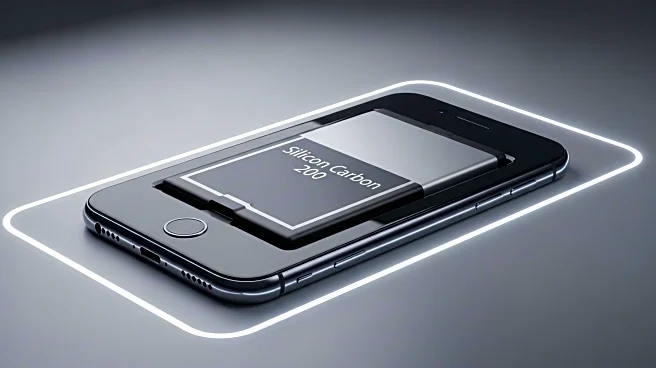What's Happening?
Silicon-carbon batteries are transforming the smartphone industry by allowing for larger battery capacities in smaller devices. This innovation is being adopted by several international companies, including Honor, Oppo, Huawei, and Xiaomi, which have released phones with these advanced batteries. These batteries use a blend of silicon and graphite for the anode, offering nearly ten times the energy density of traditional graphite anodes. However, major U.S. market players like Apple, Samsung, and Google have yet to adopt this technology. Concerns about battery longevity and compliance with EU regulations, which require batteries to retain 80% capacity after 800 charging cycles, may be contributing to their hesitation.
Why It's Important?
The adoption of silicon-carbon batteries could significantly impact the smartphone market by enabling thinner devices with longer battery life. This technology could enhance user experience and drive competition among manufacturers. However, the reluctance of U.S. companies to adopt these batteries could place them at a competitive disadvantage globally. The potential for larger batteries also raises logistical challenges, such as increased shipping costs for batteries exceeding certain capacities. The U.S. market's slow adoption may affect its competitiveness in the global tech landscape, where innovation and efficiency are key drivers.
What's Next?
As silicon-carbon batteries become more prevalent, manufacturers will likely increase the silicon content in batteries to enhance capacity further. Companies like Oppo are already planning to release phones with significantly larger batteries. The real test will be the long-term performance of these batteries, which could influence broader adoption. U.S. companies may eventually adopt this technology if it proves reliable and meets regulatory standards. The industry will also need to address logistical challenges associated with larger batteries to fully capitalize on this innovation.
Beyond the Headlines
The shift to silicon-carbon batteries highlights the ongoing evolution in battery technology, which could extend beyond smartphones to other sectors like electric vehicles and wearables. This development underscores the importance of balancing innovation with reliability and regulatory compliance. The U.S. market's cautious approach may reflect lessons learned from past issues, such as Samsung's Note 7 battery problems, emphasizing the need for thorough testing and validation before widespread adoption.









